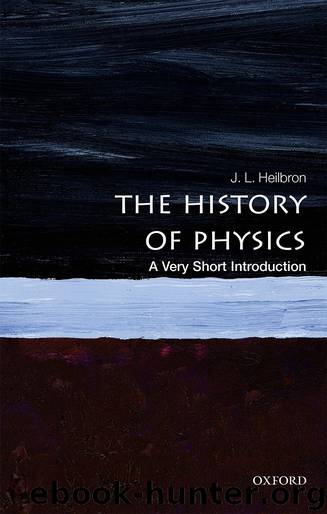The History of Physics by J. L. Heilbron

Author:J. L. Heilbron
Language: eng
Format: epub
Publisher: Oxford University Press
Published: 2017-11-28T05:00:00+00:00
Institutional frameworks
The early-modern college or university, which catered to students in their early teens, disseminated rather than advanced knowledge. Teachers of physics ambitious for literary fame would write a textbook, not a research paper, and, if they showed experiments, provided their own instruments. Around 1750, however, universities and colleges began to acquire the apparatus of deceased professors at a discount and soon had the burden of maintaining and augmenting their bargains. The cabinet of instruments, with its director-professor, mechanic-servant, and small budget, thus became as much a part of a university as a library. Some research inevitably resulted, notably at Bologna and Pavia—showplaces, respectively, of the Catholic Church and Austrian Lombardy—and at Protestant Göttingen, the only significant university founded during the 18th century in Europe. Physics as a career began to take shape: in the early 18th century three out of four professors of physics left their chairs, usually to teach and practice medicine; in the late 18th century, the proportion was reversed, and most professors of physics retired from or died in harness.
Some of these persevering professors worked in newly established higher schools for engineering, mining, forestry, and the military, such as the royal artillery school in Mézières where Nollet taught and Coulomb studied. Fifty years later, the then new École polytechnique, a product of the educational philosophy of the French Revolution, taught the latest quantified physics and prepared the leaders and professors of physical science in France. The tie between teaching in these technical schools and the systematization of physics may be symbolized by the four-volume Traité de Physique Experimentelle et Mathématique, the first modern textbook of physics, published in 1816 by a graduate of the École polytechnique, Jean-Baptiste Biot.
The advancement of knowledge was the mission of academies. Their self-image may be inferred from their mottoes. The Royal Society’s ran Nullius in verba, a contraction of Horace’s ‘bound to swear in no master’s words’. Thus they declared independence from their king, the tenets of the schools, and the dogmas of religion. The Paris Academy at its reorganization in 1699 took as its seal a sun, symbolic both of knowledge and of its king, Louis XIV, and for its motto, Invenit et perfecit. Its business was discovering and completing knowledge. The Royal Swedish Academy of Sciences, established in 1739, preferred to identify with an old man working the earth under the slogan, För Efterkommande, ‘for posterity’.
Though dissimilar in structure and operation, the prototypical academies of Paris and London had in common the pursuit of natural knowledge exclusively. Most other academies also had sections for arts and belles-lettres. At least sixty such academies with substantial interest in natural knowledge were founded between 1700 and 1790. France led the way, with half the total, reflecting a need felt by lawyers, priests, physicians, and military officers to express themselves outside the institutions of church and state. These academies helped to guide research in physics by judging papers for publication and awarding prizes and medals.
In contrast with astronomy—which, with the introduction of achromatic
Download
This site does not store any files on its server. We only index and link to content provided by other sites. Please contact the content providers to delete copyright contents if any and email us, we'll remove relevant links or contents immediately.
Enlightenment Now: The Case for Reason, Science, Humanism, and Progress by Steven Pinker(7288)
A Journey Through Charms and Defence Against the Dark Arts (Harry Potter: A Journey Through…) by Pottermore Publishing(4794)
The Immortal Life of Henrietta Lacks by Rebecca Skloot(4566)
A Journey Through Divination and Astronomy by Publishing Pottermore(4370)
Elon Musk by Ashlee Vance(4110)
Origin Story: A Big History of Everything by David Christian(3678)
COSMOS by Carl Sagan(3607)
Alchemy and Alchemists by C. J. S. Thompson(3504)
Bad Pharma by Ben Goldacre(3413)
Enlightenment Now by Steven Pinker(3359)
Shadow of Night by Deborah Harkness(3343)
Inferior by Angela Saini(3300)
A Mind For Numbers: How to Excel at Math and Science (Even If You Flunked Algebra) by Barbara Oakley(3288)
Origin Story by David Christian(3185)
The Code Book by Simon Singh(3162)
Signature in the Cell: DNA and the Evidence for Intelligent Design by Stephen C. Meyer(3117)
The Elements by Theodore Gray(3039)
A Brief History of Time by Stephen Hawking(3009)
A Journey Through Potions and Herbology (A Journey Through…) by Pottermore Publishing(2842)
